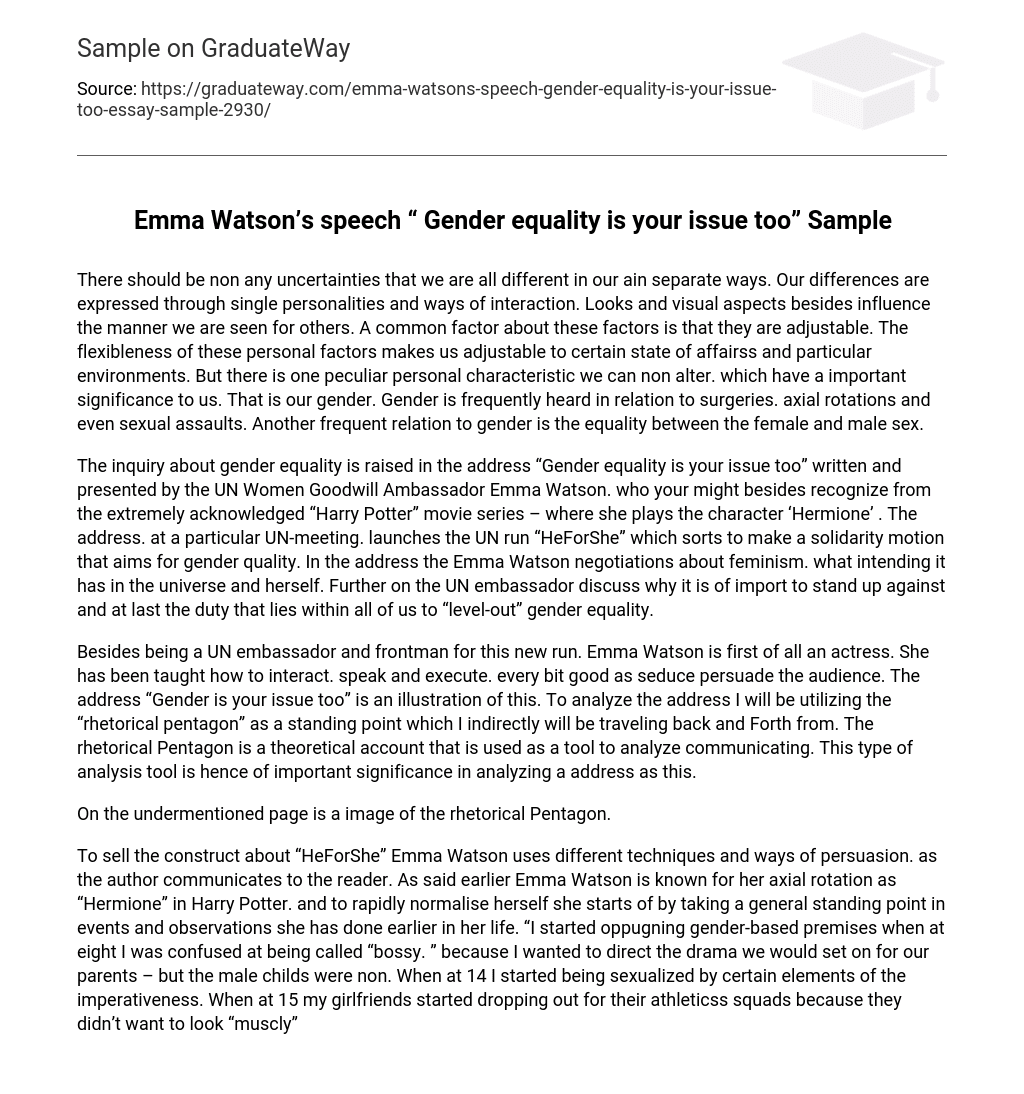Undoubtedly, we all possess distinct qualities that make us unique. Our individual traits and methods of communication exemplify these differences. Furthermore, our physical appearance and visual attributes contribute to how we are perceived by others. It is worth noting that these aspects can be altered according to the circumstances or surroundings.
Nevertheless, there exists one personal attribute that remains immutable and holds great significance – our gender. Gender often becomes associated with surgical procedures, societal roles, and unfortunately even sexual violence. Another prevalent topic surrounding gender is the pursuit of equality between males and females.
The UN Women Goodwill Ambassador Emma Watson addresses the issue of gender equality in her speech titled “Gender equality is your issue too.” Watson, best known for her role as ‘Hermione’ in the popular “Harry Potter” movie series, presents this speech at a UN meeting to launch the “HeForShe” campaign, which aims to promote solidarity and achieve gender equality. In her address, Watson talks about feminism, its meaning in the world and to herself. Additionally, she discusses the importance of standing up against inequality and emphasizes the collective responsibility we all have to achieve gender equality.
Emma Watson is not only a UN ambassador and frontman for a new run, but also an actress who has been trained in various skills such as interaction, speaking, execution, and persuasion. Her speech titled “Gender is your issue too” showcases these abilities. To analyze this speech, I will use the “rhetorical pentagon” as a framework, which allows for a thorough examination of communication. The rhetorical pentagon is a model used to analyze and understand speeches, making it essential in the analysis of this particular address.
On the page below, there is an image of the rhetorical Pentagon.
Emma Watson employs various techniques and persuasive methods to advocate for the concept of “HeForShe.” She initiates by establishing a connection with the reader, referring to her well-known portrayal as “Hermione” in Harry Potter. To quickly establish familiarity, she adopts a broad perspective on events and observations from her own life. For example, Watson highlights instances from her childhood where she questioned assumptions based on gender. At the age of eight, she felt perplexed when labeled as “bossy” for desiring to direct a play, while boys faced no similar criticism. When she was 14, certain aspects of the media subjected her to sexualization. Furthermore, at 15, her female friends quit their sports teams due to concerns about appearing excessively muscular.
When I turned 18, I observed that my male friends had difficulty conveying their feelings. Emma Watson stresses the significance of perceiving her as a regular person instead of a famous actress. She expresses concern for the difficulties faced by ordinary people and downplays her celebrity status to empathize with those who have normal jobs. Additionally, Emma Watson exhibits comprehension of gender equality by gaining valuable insights from her own personal encounters.
In addition to expressing her opinion on the subject, the UN ambassador has also highlighted other governmental voices that she believes have made a significant impact on gender equality. By including these other perspectives, she builds credibility and demonstrates an openness to different yet similar attitudes. She references Hilary Clinton, who is seen as an inspiration for independent women, and Edmund Burke, an 18th-century conservative politician and writer from England/Ireland.
Emma Watson gave a speech with the objective of informing and persuading readers about the campaign “HeForShe”. She began by introducing the campaign, stating: “Today we are launching a campaign called ‘HeForShe.’ I am reaching out to you because I need your help. We want to put an end to gender inequality – and in order to achieve that, we require everyone’s involvement. This is the first campaign of its kind at the United Nations: our aim is to surprise and engage as many men and boys as possible to advocate for gender equality. Moreover, our intention is not just limited to discussing this issue, but making sure it translates into tangible actions.” These initial remarks effectively outline the agenda for the goals of “HeForShe”.
In her address, Emma Watson establishes a connection with the audience through the frequent use of personal pronouns. This creates a sense of intimacy and trust between her and the audience/reader. She maintains this personal and emotional tone throughout the address, which she delivers as a United Nations ambassador to a significant audience. However, in order to make the speech accessible to a wider audience, Watson chooses to use simple and everyday language. This further enhances the personal connection she establishes with her audience and reader. The previously mentioned observations are evident in the provided quote.
In order to effectively engage her readers, UN ambassador Emma Watson relies on rhetorical questions, such as “if not me, who? If not now, when?” These questions prompt readers to ponder the same issues that Watson addresses in her speech. The issue of gender equality is a concern that impacts everyone, and it necessitates collective efforts for improvement. Watson reinforces the significance of collective action by reiterating the aforementioned quote at the end of her speech.
The text emphasizes the importance of everyone taking a stand and fighting for gender equality. In addition to using this address to kickstart the campaign, the address also aims to deliver this message to the audience. The primary audience of the speech is the attendees of the UN meeting, while the secondary audience is the rest of the world. Emma Watson hopes to inform and inspire them.





